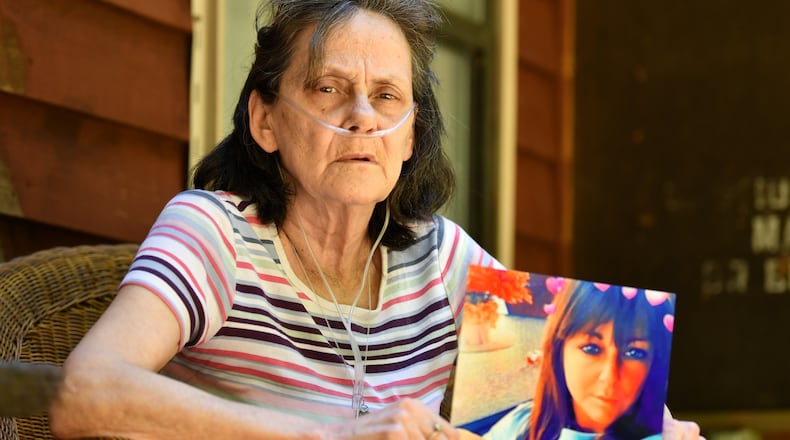U.S. Sen. Jon Ossoff is asking the FBI to investigate the mounting gang violence and extortion at Pulaski State Prison, calling the situation inside Georgia’s second largest prison for women “tragic and wholly unacceptable.”
Ossoff made the request Wednesday in a letter to FBI Director Christopher Wray. The senator’s letter follows articles in The Atlanta Journal-Constitution detailing how gang members have taken control of the Hawkinsville prison, engaging in brutal acts of violence as well as extorting other inmates and their families for “protection.”
Ossoff outlined many of the incidents in the AJC’s stories and noted that the FBI has the authority to investigate such matters under the Racketeer Influenced and Corrupt Organizations Act, commonly known as RICO.
“Due to the disturbing and violent nature of the acts described, I ask that the FBI consider looking into this pattern of gang-related extortion at Pulaski and other Georgia prisons where it may be occurring,” Ossoff wrote.
Extortion can also be prosecuted as federal crime if investigators find a so-called “interstate nexus,” meaning communication or financial transactions that cross state lines.
The Georgia Department of Corrections responded to Ossoff’s letter with a statement saying that the department has opened 20 cases involving gang, assault or extortion activity at Pulaski this year. When cases of that nature are substantiated, they are presented for prosecution, the statement says.
Credit: Credit: U.S. Senate video screen grab
Credit: Credit: U.S. Senate video screen grab
The statement also points out that the GDC has a full-time coordinator for monitoring gangs, known within the prison system as Security Threat Groups, along with 31 sergeant positions devoted to that effort. “The GDC does not condone gang activity and, with the help of state leadership, has taken an aggressive approach in rooting out this unacceptable behavior,” the statement says.
Pamela Dixon, an Ellijay resident who was the subject of an AJC article describing how she had paid more than $10,000 within the last year for her daughter’s protection at Pulaski, said she hopes Ossoff’s letter to Wray is a first step toward cleaning up a corrupt prison.
“I know there’s a long way to go, but this is a beginning,” she said.
The violence at Pulaski, one of Georgia’s four prisons for women, has been ongoing since an influx of new inmates arrived from the larger Lee Arrendale State Prison at the end of last year. With the arrival of the new inmates, a dominant gang — the Bloods — quickly overwhelmed the facility’s depleted security staff and has remained in control since, the AJC has found.
In March, an AJC investigation described numerous gang-related acts of violence, including allegations from two inmates, Norma Juarez-Morales and Carla Cardenas-Becerra, that they were violently beaten and sexually assaulted by gang members in January when Juarez-Morales refused to pay for protection. The story also detailed an incident in which a gang member broke into the room of another inmate and bit off a portion of her ear.
Earlier this month, the AJC detailed how gang members have been routinely extorting other inmates and their families, seeking payments via Cash App even for such things as the right to take a shower or sleep in an assigned room.
In that story, Dixon outlined how she had been forced to pay gang members to ensure the safety of her daughter, Mary Elizabeth Lewis, and how she had been extorted herself in phone calls from the prison, including one she recorded on May 30.
Credit: Contributed
Credit: Contributed
On the recording, the caller can be heard saying she would disfigure Lewis’ face if Dixon failed to pay $300 via Cash App before 8 that night. Dixon paid the money and then forwarded the recording to a GDC administrator, which led to Lewis being placed in protective custody.
The violence among inmates at Pulaski and other Georgia prisons currently is the subject of a civil rights investigation by the U.S. Department of Justice, but that probe, officially launched last September, isn’t aimed at criminal charges. If the DOJ finds evidence of systemic violations, it will most likely issue a report outlining remedial measures.
Credit: HYOSUB SHIN / AJC
Credit: HYOSUB SHIN / AJC
The DOJ has said Georgia is impeding its investigation, and the federal government is currently seeking a judge’s order requiring the GDC to comply with a subpoena for records. The GDC, claiming it is safeguarding the privacy of inmates and staff, has refused to comply unless the DOJ provides a non-disclosure agreement.
In his letter to Wray, Ossoff expressed his concern for the level of violence throughout the Georgia prison system and noted that he had previously communicated with the official heading the DOJ investigation, Assistant U.S. Attorney Kristen Clarke.
“The challenges facing Georgia’s prisons are not new,” Ossoff wrote. “This work is urgent. I will continue to monitor efforts to protect the safety, wellbeing and civil rights of both incarcerated people and prison employees.”
Investigative reporter Danny Robbins can be reached by emailing AJCinvestigations@ajc.com
Our reporting
Since 2015, AJC investigations have revealed how the lives of Pulaski State Prison inmates have been placed in jeopardy. After the AJC reported how a number of women needing medical care died under questionable circumstances, the state initiated a series of reforms. In the latest investigations, the AJC has detailed how gang members were subjecting other inmates to brutal acts of violence and extorting money from the prisoners and their families.
About the Author
Keep Reading
The Latest
Featured






